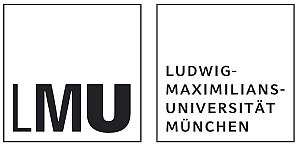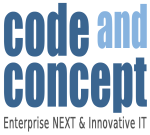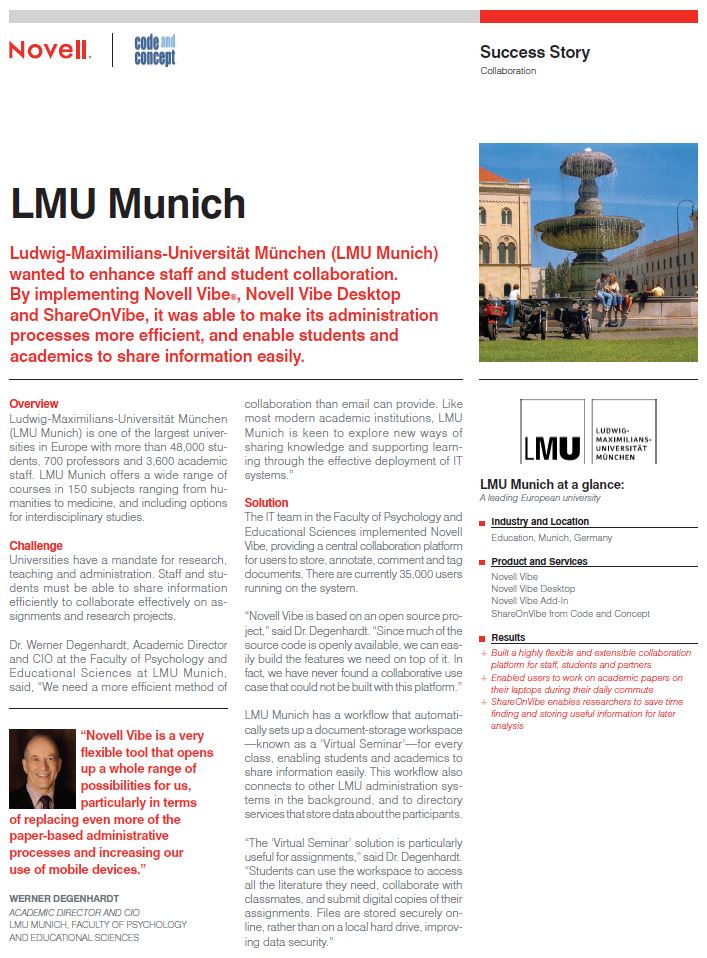A Customer Success Story with Code and Concept and ShareOnVibe
A Customer Success Story with Code and Concept and ShareOnVibe
Novell published a Success Story about the Novell Vibe installation at LMU Munich (linked below). Our contribution to LMU Munich’s success was highlighted by Novell, so we want to share this Success Story with you. This is the official Success Story by Novell as you can find it on the linked site.
About LMU Munich
Ludwig-Maximilians-Universität München (LMU Munich) is one of the largest universities in Europe with more than 48,000 students, 700 professors and 3,600 academic staff. LMU Munich offers a wide range of courses in 150 subjects ranging from humanities to medicine, and including options for interdisciplinary studies.
Challenge
Universities have a mandate for research, teaching and administration. Staff and students must be able to share information efficiently to collaborate effectively on assignments and research projects. Dr. Werner Degenhardt, Academic Director and CIO at the Faculty of Psychology and Educational Sciences at LMU Munich, said, “We need a more efficient method of collaboration than email can provide. Like most modern academic institutions, LMU Munich is keen to explore new ways of sharing knowledge and supporting learning through the effective deployment of IT systems.”
Solution
The IT team in the Faculty of Psychology and Educational Sciences implemented Novell Vibe, providing a central collaboration platform for users to store, annotate, comment and tag documents. There are currently 35,000 users running on the system.
“Novell Vibe is based on an open source project,” said Dr. Degenhardt. “Since much of the source code is openly available, we can easily build the features we need on top of it. In fact, we have never found a collaborative use case that could not be built with this platform.”
LMU Munich has a workflow that automatically sets up a document-storage workspace —known as a ‘Virtual Seminar’—for every class, enabling students and academics to share information easily. This workflow also connects to other LMU administration systems in the background, and to directory services that store data about the participants. “The ‘Virtual Seminar’ solution is particularly useful for assignments,” said Dr. Degenhardt. “Students can use the workspace to access all the literature they need, collaborate with classmates, and submit digital copies of their assignments. Files are stored securely online, rather than on a local hard drive, improving data security.” Prospective post-graduate students can also use Novell Vibe to apply for courses by uploading the relevant files and completing application forms, helping LMU Munich replace outdated paper-based administrative processes.
Results
The university extended its longstanding Novell Vibe solution by implementing Novell Vibe Desktop and ShareOnVibe to increase staff and student productivity.
Novell Vibe Desktop saves and synchronises files from the user’s desktop to the Vibe site, enabling users to work offline on documents using any PC or Mac. “With Novell Vibe Desktop, students and staff can work on academic papers on their laptops during their daily commute,” said Dr. Degenhardt. “The next time they connect to the internet, files are automatically synchronised, making it the easiest and most secure way to work on documents. As different versions of files are created automatically, there is no longer any risk of colleagues working on a document simultaneously and having to compare different versions later.”
The university also implemented the Novell Vibe Add-In for Microsoft Office, which enables users to work on text documents, presentations and spreadsheets directly inside their Office applications without having to open a browser and connect to the Vibe server. LMU Munich also leveraged ShareOnVibe, a Firefox add-on developed by Code and Concept, a Novell® solution provider and system integrator based in Munich.
When students and academics research a topic, they often come across interesting pieces of information online in all types of formats, such as text, videos and PDFs.
They want to save this information quickly so that they can study it more closely at a later date. ShareOnVibe enables students and staff to store information in Novell Vibe in just a few clicks, because metadata such as the web address and the page title is saved automatically.
“ShareOnVibe saves students and researchers considerable time in finding and storing information – and avoids desks cluttered with sticky notes! ” said Dr. Degenhardt. “We work with Code and Concept because they provide us with smart solutions – like ShareOnVibe – to real-world issues, rather than just implementing another piece of software.
“We work with Code and Concept because they provide us with smart solutions – like ShareOnVibe – to real-world issues, rather than just implementing another piece of software.”
With Novell Vibe, LMU Munich has gained a user-friendly collaboration platform for staff and students that enables them to work together more effectively. “Novell Vibe is a very flexible tool that opens up a whole range of possibilities for us, particularly in terms of replacing even more of the paper-based administrative processes and our increasing use of mobile devices,” said Dr. Degenhardt.
“We did not select Novell Vibe – Novell Vibe
selected us.”
Take a look behind the scenes at LMU Munich and get to know the IT department of the Faculty of Psychology and Educational Sciences.
In this video Dr. Werner Degenhardt from LMU Munich and Christian Giese from Code and Concept are explaining the success of Novell Vibe and ShareOnVibe to enhance student and staff collaboration and to boost people’s productivity. It’s all about not mixing up “people centered social networks” and “content centered social collaboration”.
Novell Vibe is a very flexible tool that opens up a whole range of possibilities for us, particularly in terms of replacing even more of the paper-based administrative processes and our increasing use of mobile devices.
Since much of the source code is openly available, we can easily build the features we need on top of it. In fact, we have never found a collaborative use case that could not be built with this platform.”
Links:
- Die Success Story auf netiq.com: https://www.netiq.com/de-de/success/stories/lmu-munich-provides-outstanding-student-services-securely.html
- Die Success Story zum Download als PDF: https://www.novell.com/docrep/2015/06/lmu_munich_provides_outstanding_student_services_securely_success_story_de.pdf
- Fakultät für Psychologie und Pädagogik , LMU München: http://www.fak11.lmu.de


